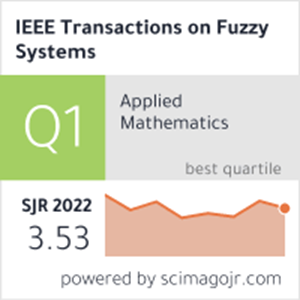Prescribed-Time Cooperative Control of Multilateral Teleoperation Systems: A Novel Composite Fuzzy Learning-Based Approach
IF 11.9
1区 计算机科学
Q1 COMPUTER SCIENCE, ARTIFICIAL INTELLIGENCE
引用次数: 0
Abstract
In this article, a novel prescribed-time composite learning-enhanced fuzzy (PrTCLF) cooperative control approach is proposed for the multiple-leadermultiple-follower (MLMF) teleoperation systems in the presence of system model uncertainties and external interferences. First, compared with traditional MLMF systems, a unifying virtual leader–follower teleoperation control framework, notably applicative for more general situations where the number of leaderand follower robots is not the same, is constructed by introducing scheduled control authority for different operators, especially in cooperative control mode. A significant feature of this article is that the first result of a novel time-dependent function integrated PrTCLF learning law rendering all the synchronization errors of the uncertain MLMF teleoperation system to zero is creatively derived, by which the effect of the traditional fuzzy learning error on the precision of system convergence is essentially solved. Meanwhile, in order to ensure the high efficiency and robustness of cooperative work, a new class of nonsingular prescribed-time terminal sliding mode surface is designed without any switching behavior. Besides, the sufficient conditions for maintaining the prescribed-time stability of the MLMF teleoperation system are provided through systematic Lyapunov stability analysis. Finally, the effectiveness of the control structure and algorithm is verified by a large number of simulation and experimental results.多边遥操作系统的规定时间协同控制:一种基于复合模糊学习的新方法
针对存在模型不确定性和外部干扰的多领导多跟随远程操作系统,提出了一种新的规定时间复合学习增强模糊(PrTCLF)协同控制方法。首先,与传统MLMF系统相比,通过引入不同操作者的预定控制权限,构建了统一的虚拟leader-follower远操作控制框架,特别适用于leader和follower数量不相同的一般情况,特别是在协同控制模式下。本文的一个显著特点是创造性地推导了一种新颖的时变函数集成PrTCLF学习律的第一个结果,使不确定MLMF遥操作系统的同步误差全部为零,从而从根本上解决了传统模糊学习误差对系统收敛精度的影响。同时,为了保证协同工作的高效率和鲁棒性,设计了一类新的无切换行为的非奇异定时终端滑模曲面。此外,通过系统的Lyapunov稳定性分析,给出了MLMF远程操作系统保持规定时间稳定性的充分条件。最后,通过大量的仿真和实验结果验证了控制结构和算法的有效性。
本文章由计算机程序翻译,如有差异,请以英文原文为准。
求助全文
约1分钟内获得全文
求助全文
来源期刊

IEEE Transactions on Fuzzy Systems
工程技术-工程:电子与电气
CiteScore
20.50
自引率
13.40%
发文量
517
审稿时长
3.0 months
期刊介绍:
The IEEE Transactions on Fuzzy Systems is a scholarly journal that focuses on the theory, design, and application of fuzzy systems. It aims to publish high-quality technical papers that contribute significant technical knowledge and exploratory developments in the field of fuzzy systems. The journal particularly emphasizes engineering systems and scientific applications. In addition to research articles, the Transactions also includes a letters section featuring current information, comments, and rebuttals related to published papers.
 求助内容:
求助内容: 应助结果提醒方式:
应助结果提醒方式:


